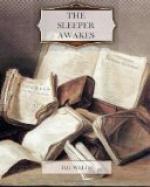A conviction took possession of his mind that this man was dead. He became active and noisy, strode across the room, blundering against the table as he did so, and rang the bell.
“Please bring a light at once,” he said in the passage. “There is something wrong with my friend.”
He returned to the motionless seated figure, grasped the shoulder, shook it, shouted. The room was flooded with yellow glare as his landlady entered with the light. His face was white as he turned blinking towards her. “I must fetch a doctor,” he said. “It is either death or a fit. Is there a doctor in the village? Where is a doctor to be found?”
CHAPTER II
THE TRANCE
The state of cataleptic rigour into which this man had fallen, lasted for an unprecedented length of time, and then he passed slowly to the flaccid state, to a lax attitude suggestive of profound repose. Then it was his eyes could be closed.
He was removed from the hotel to the Boscastle surgery, and from the surgery, after some weeks, to London. But he still resisted every attempt at reanimation. After a time, for reasons that will appear later, these attempts were discontinued. For a great space he lay in that strange condition, inert and still—neither dead nor living but, as it were, suspended, hanging midway between nothingness and existence. His was a darkness unbroken by a ray of thought or sensation, a dreamless inanition, a vast space of peace. The tumult of his mind had swelled and risen to an abrupt climax of silence. Where was the man? Where is any man when insensibility takes hold of him?
“It seems only yesterday,” said Isbister. “I remember it all as though it happened yesterday—clearer, perhaps, than if it had happened yesterday.”
It was the Isbister of the last chapter, but he was no longer a young man. The hair that had been brown and a trifle in excess of the fashionable length, was iron grey and clipped close, and the face that had been pink and white was buff and ruddy. He had a pointed beard shot with grey. He talked to an elderly man who wore a summer suit of drill (the summer of that year was unusually hot). This was Warming, a London solicitor and next of kin to Graham, the man who had fallen into the trance. And the two men stood side by side in a room in a house in London regarding his recumbent figure.
It was a yellow figure lying lax upon a water-bed and clad in a flowing shirt, a figure with a shrunken face and a stubby beard, lean limbs and lank nails, and about it was a case of thin glass. This glass seemed to mark off the sleeper from the reality of life about him, he was a thing apart, a strange, isolated abnormality. The two men stood close to the glass, peering in.
“The thing gave me a shock,” said Isbister. “I feel a queer sort of surprise even now when I think of his white eyes. They were white, you know, rolled up. Coming here again brings it all back to me.”




